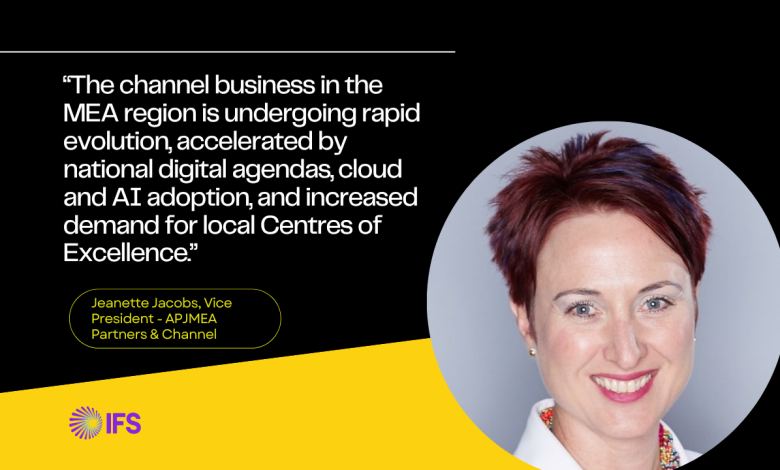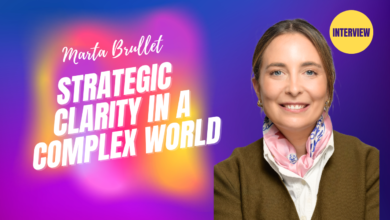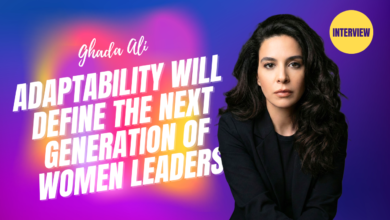“Sustainable Growth Requires Customer Centricity”

Jeanette Jacobs, the Vice President for APJMEA Partners & Channel at IFS, says the channel business in the Middle East and Africa is undergoing rapid evolution
Could you share an overview of your career path to date, highlighting the pivotal moments or achievements that have shaped your leadership within the IT channel?
My journey in the IT sector has been a blend of business development and strategic leadership, rooted in a belief that technology is only as powerful as the ecosystem delivering it. Early in my career, I honed my skills in business consultancy and solution sales, with the like of Oracle and IBM, which gave me a solid foundation to understand the enterprise software landscape and its market dynamics. As I transitioned into leadership roles, I’ve had the privilege of mentoring partners, launching regional go-to-market initiatives, and helping build a resilient channel that delivers both commercial impact and customer success.
Joining IFS was a defining milestone. Competing and winning against larger traditional ERP vendors and continuously surpassing expectations with double digit growth year after year. IFS’s niche specialization and industry-tailored solutions sets us apart giving our partners a strong growth framework, coupled with our partner-first strategy. This strategy opens new doors for partner-led transformation projects giving them a competitive edge in sectors where other vendors are struggling to keep pace with fast changing leadership in industrial and agentic AI.
As a key channel influencer within your company, what are your primary roles and responsibilities in shaping strategy, driving engagement, and fostering growth within the partner ecosystem?
As a leader across the APJMEA region, my role centres around building strategic partnerships with local and global integrators. This includes aligning our partner ecosystem with the company global objectives while adapting to the unique economic and digital priorities of the region. I focus on three core areas:
- Strategy: Designing scalable partner models, economically viable for different regions, that emphasize vertical specialization, outcome-based selling, and localisation.
- Engagement: Deepening relationships with channel partners through enablement, joint marketing, and executive alignment.
- Growth: Identifying new markets and verticals our partners can expand to, especially in growth territories and in sectors investing in digitization.
How would you assess the current health and evolution of the IT channel, particularly within our region? What significant trends or shifts are you observing?
The Channel business in the Middle East and Africa is undergoing rapid evolution, accelerated by national digital agendas, cloud and AI adoption, and increased demand for local Centres of Excellence and expertise especially in UAE, Saudi, and Egypt. In Saudi Arabia, Vision 2030 is creating significant momentum around cloud migration, smart city initiatives, and digital manufacturing. Partners are aligning with government mandates and enterprise customers to deliver large-scale transformations.
The UAE followed by the rest of Gulf continue to lead with innovation hubs, attracting global and regional tech players. Africa and the rest of Middle East presents immense untapped potential, particularly in Egypt, East, and West Africa, where mobile-first ecosystems are paving the way for cloud-native services.
However, the transformation is uneven. While some partners are evolving into managed service providers and solution integrators, others are still dependent on traditional reselling. Bridging this maturity gap and partnering stronger together is critical to future success.
How would you assess the current health and evolution of the IT channel, particularly within our region? What significant trends or shifts are you observing?
The biggest challenge today is the shift in adapting their business models. Many regional partners still rely on transactional revenue streams, nesting on existing legacies, which are increasingly unsustainable in a SaaS- and subscription-driven economy.
Yet, this challenge is also an opportunity. The Middle East and Africa are seeing growing demand for verticalized solutions in industries like public sector, logistics, and oil & gas — especially where AI and automation can create immediate impact. Partners who invest in industrial AI, cloud platforms, and customer success frameworks will lead the next wave of growth.
In your opinion, what are the most effective strategies partners can employ to drive sustainable growth and profitability in the current market, especially considering evolving customer demands?
Sustainable growth requires Customer Centricity, speaking the customer language, understanding business KPIs and desired business outcomes, and shaping the transformation journey. This is coupled with strategic alliances with ISVs, hyperscalers, niche consultancies, and centre of excellence hubs, to co-create solutions and to take ownership of the customer digital innovation journey. Especially in regions like the Kingdom of Saudi Arabia where public-private partnerships and local content programs are central to investment, partners must differentiate through innovation, compliance, and domain expertise.
How is the rapid advancement of AI, including Agentic AI and Generative AI, fundamentally reshaping the channel’s business models, partner opportunities, and the skill sets required for success?
The rise of Generative and Agentic AI is transforming the way the channel operates. For partners, this means upskilling teams, embracing AI-native platforms, and creating governance models that ensure responsible AI adoption. The opportunity lies in becoming AI integrators — guiding customers from experimentation to enterprise-scale adoption.
Given the escalating sophistication of cyber threats, how can channel partners best position themselves to deliver comprehensive cybersecurity solutions, moving beyond traditional offerings to address emerging risks like AI evasion?
Cyber threats are growing more complex, with attackers using AI to bypass traditional defences. Channel partners must move from selling point solutions to delivering end-to-end security frameworks. This creates both responsibility and opportunity for trusted mature and AI savvy partners.
Environmental, Social, and Governance (ESG) factors and sustainability are gaining prominence. How can channel partners integrate these principles into their operations and offerings to create competitive advantages and meet evolving client expectations?
Sustainability is gaining momentum across the region, not only as a corporate value but as a business driver. In Saudi Arabia and the United Arab Emirates specifically, green energy projects and smart infrastructure initiatives are making ESG part of the technology conversation. To be considered as responsible, channel partners must not only ensure their principles are measured and delivered against gaols but also ensure the partners they work with uphold the same principles transparently.
The IT landscape demands continuous learning. What advice do you have for channel partners on attracting, developing, and retaining top talent, particularly in areas like AI, cloud security, and specialized industry solutions?
The skills gap is widening, especially in cloud security, AI, and industry-specific software. Partners must focus on upskilling existing talent through certification and mentorship, attracting young local talent via partnerships with universities, and promoting diversity, remote work, and purpose-driven careers
In regions like Africa, Saudi, and the Levant, young, tech-savvy talent presents a real opportunity, if properly harnessed.
How do you see the roles of different partner types—such as Managed Service Providers (MSPs), Independent Software Vendors (ISVs), and system integrators—evolving, and how can they best collaborate to deliver integrated solutions?
Rather than competing, these roles are collaborating to deliver business value, integrated solutions, and customer success through alliances, consortiums, or through joint IP on the Marketplace. Software vendors channel success is defined by how far they are invested in composable technology that allows partners to plug in capabilities and co-innovate around customer needs.
Drawing from your experience and looking ahead, what is your most crucial piece of advice for partners seeking long-term success and relevance in this rapidly transforming IT channel?
To remain relevant, channel partners must embrace agility, deliver outcomes, and invest in people and innovation. The regional IT market is in an unprecedented trajectory to become a global player. Governments are digitizing. Enterprises are modernizing. Customers are expecting more. Long-term success will belong to those who build trust, deliver value consistently, and stay ahead of the innovation curve.




